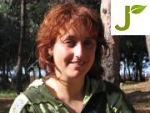Culture Change Subscribe
A selection of initiatives, blogs, resources and communities on Jewcology which focus on culture change.
Blogs
Don’t Buy Bottled Water
One of the core tenets of Judaism that links it to the environmental movement is the tenet of Baal Tashchit: “do not waste” or “do not destroy.” While it may be convenient, especially in the summer heat, to buy a bottle of disposable bottled water, there are many environmental and health reasons why you should resist this urge. Why Bottled Water is Bad for the Environment: Consider these statistics from the non-profit organization Food and Water Watch before you spend money on bottled water: As much as 40 percent of bottled ...
Trees, Bikes and Nature on Yom Ha’atzmaut
NEW YORK (April 26, 2012) — Falafel fests, movie nights, dance parties — Americans celebrate Yom Ha’atzmaut in many ways. But what do Israelis do on Independence Day? They head outdoors. Last year so many people jammed into the country’s de-facto national-park system, run by KKL-JNF, that parks were closed because they reached capacity. So, how many people was that, you ask? About one in every five Israelis — more than 1.5 million people — which is also about the same number of trees that have been planted in Israel since ...
Clean the Land: Love It. Live It. Clean It.
It’s happened to each and every one of us. You’re at the beach in Tel Aviv, surrounded by white sand, blue sea, shining sun…and, of course, bronzed bodies. With the enthusiasm of a kid in a candy store, you run to the water and jump in. “This is just too perfect! This has to be a dream!” you think to yourself. You dip your head, envisioning yourself recreating one of those movie scenes where you emerge from the water with your hair slicked, basking in the Mediterranean sun. Unfortunately, when you break the ...
Seeds Of Peace: Botanical Gardens To Connect Jews And Arabs
Seeds Of Peace: Botanical Gardens To Connect Jews And Arabs By Hanna Szekeres The Botanical Gardens in Jerusalem, Israel is a 30-acre oasis where you can see, smell and even taste over 10,000 species of flowers from around the world. But the educational department of the gardens also focuses on another type of seed: “the seeds of peace.” Five years ago the department started a project called “Coexistence” that brings together nine- to 11-year-olds from the city’s Jewish and Muslim schools and teaches them about the production ...
Solar Project Completed and Dedicated at Temple Sinai of Glendale
With donations from over 50% of our congregation, we were able to raise the down payment for our solar panel system by the time construction was completed! Panels are anticipated to produce from 35 to 50% or more of our power as we continue to take conservation measures. We hope it will be encouraging to congregants to consider doing the same for their own homes.
Equity or the Flood: Two Visions of Justice
It is now seven weeks to Passover and the Passover foods are already for sale in my local supermarket. My family is already planning when to do our shopping and whom to invite to the seder. Like many Jewish families, we put a lot of time and preparations into this holiday because we want to make it special and different from the rest of the year as was done when we were children. But our preparations are not only about shopping, cooking, invites and the changeover of dishes. Every year, we spend at least a little time considering what we ...
Intern at Israeli Green Companies (CJN July 2011)
This "Sustainable Jew" column appeared in the canadian Jewish News on July 7, 2011 Once a year, Moses Znaimer convenes the Ideacity conference in Toronto. This year, the focus was the concept that the rate of cultural and economic progress depends on the rate at which ideas are having sex. The idea was first proposed by Matt Ridley, author of The Rational Optimist. Saul Singer, co-author of the book Startup Nation: the Story of Israel’s Economic Miracle, spoke at the conference and made a valiant effort to connect Israel’s transformation ...
Take Care Reproducing Documents (CJN May 2011)
This "Sustainable Jew" column originally appeared in the Canadian Jewish News May 12, 2011 We are now in “sphirat ha-omer,” the count-up to Shavuot—the time of the giving of our Torah. Our study and transmission of our Written and Oral Laws ("Torah Shebichtav" and "Torah Sheba'al Peh," respectively) has benefitted from technological advancement. We are known as the “People of the Book”—five books of Moses, 24 books of Tanakh, countless written commentaries—but many are beginning to find ...
Wealth & Worth – Sustainable Celebrations
(reposted from Rabbi Nina Beth Cardin's blog: http://blog.bjen.org/, dated December 1, 2011) The Maryland Chapter of the American Jewish Congress is developing a Green and Just Celebrations Guide for the Jewish community of Baltimore. Inspired by a guide of the same name published by Jews United for Justice in Washington, DC, it will be available (fall 2012) through synagogues and on the web, designed to make events and celebrations environmentally friendly, socially responsible, affordable and fun. This is not the first time in Jewish history that ...
Shabbat Brit Olam – Annual “Sustainability Shabbat” in Israel
Dear Friends, Shalom! We are proud to report that for the third consecutive year, Teva Ivri joined the international Jewish world in the observance of Shabbat Noach as a “Sustainability Shabbat” – a time to raise awareness about environmental challenges and to inspire effective change in Jewish communities. A few weeks ago, hundreds of communities from all denominations of Judaism observed Shabbat Noah from a Jewish-Environmental perspective, with study groups, lectures, articles in the media, and grassroots action projects throughout the ...
Why We Occupy Shabbat!
This past Shabbat I participated in Vancouver’s first “Occupy Shabbat.” The thirty of us crammed into Occupy Vancouver’s meditation tent weren’t the only ones celebrating this way. In cities across North America, Jews of all types are joining together to Occupy Shabbat in conjunction with the Occupy Together movement now galvanizing the continent. What does it mean to celebrate this weekly holy day in solidarity with and surrounded by activists, artists, and people calling for a better tomorrow? What can we learn from this day about ...
On Jews and Gold
As the global economy continues down the tumultuous path toward financial meltdown, the value of gold has correspondingly skyrocketed. From a value of around $300 an ounce in the year 2000, the price of gold today sits at $1,784. The price of silver has had even more of a meteoric rise during this same period. Very likely this move toward the precious metals is a reflection of investors fears regarding the fiat money system itself and the reserve-banking ponzy scheme that is destabilizing governments worldwide. What, you might ask at this point, is a blog post about ...
Generation of Change: How Leaders in their 20s and 30s are Reshaping American Jewish Life
In September 2010, the Avi Chai Foundation put out a report “Generation of Change: How Leaders in their 20s and 30s are Reshaping American Jewish Life.” The report elicited responses from 4,466 Jewish leaders of all ages, myself included, and after thorough analysis of the data came up with a range of interesting results that I believe relate directly to our work as Jewcologists. The survey divided respondents into a number of categories, based on 2 main factors. Establishment vs Non-establishment Jewish leadership, and Young (20s& 30s) vs Older. ...








